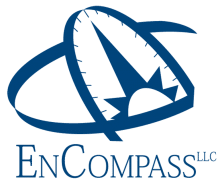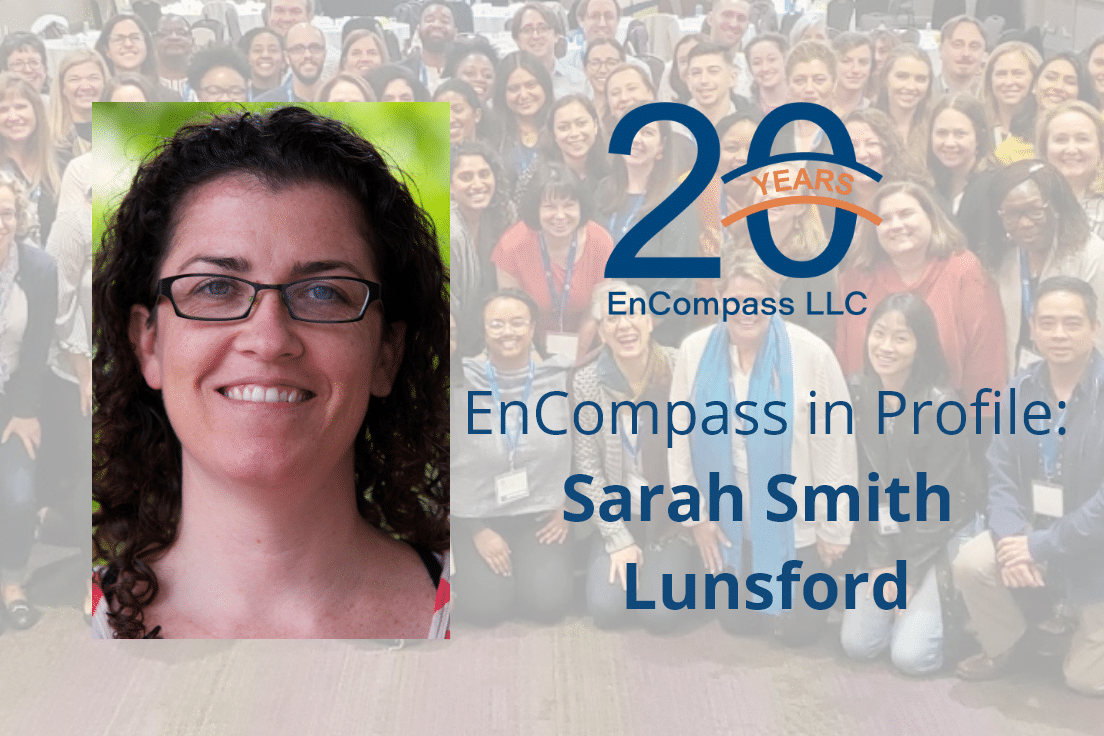We’re excited to introduce this new series profiling team members from around the company. This month, we feature Senior Evaluation Specialist Sarah Smith Lunsford, who also chairs EnCompass’ Institutional Review Board. Sarah shares her experience helping to shape EnCompass’ directions in health and providing leadership for qualitative research and evaluation. We’re doubly glad to feature Sarah as part of our #EvaluationWednesdays series this February.
What brought you to EnCompass? Tell us a little about your background.
My interest in health started early, volunteering at a hospital daycare and working with children infected and affected by HIV/AIDS. That gave me an early view of some of the complexity and systemic barriers that come into play in healthcare. I saw those barriers play out in other jobs and other locations, and eventually it made sense to get my MPH.
I was drawn to both domestic and global work, but I decided to focus on international health and development. From there, I found myself working with organizations like the World Health Organization in Cambodia, doing ethnographic research on dengue treatment, prevention, and control behaviors and supporting training on qualitative research methods. I got my PhD in medical anthropology in 2011 and started working with EnCompass that year on the USAID Health Care Improvement project. And then with the USAID ASSIST project, which continued the work of HCI. I found the research focus in those projects really rewarding.
What was it about those projects that made the work special?
A bunch of things, but especially the partnerships with country staff and the two-way capacity building that happened as a result. On ASSIST, I was the Senior Advisor for Research and Evaluation, leading or supporting 10 to 12 study teams at any given time. So, I couldn’t always be there in person, but we always paired a home-office investigator with a field investigator. That ensured a sense of shared responsibility and improved capacity on both sides. We learned a lot from the in-country staff about the contextual realities of implementation research. At the same time, we helped strengthen their capacity in evaluation design, as well as guiding them to conduct utilization-focused qualitative research. I remember for one study, we worked with three pan-African organizations providing services for orphans and vulnerable children. Their services differed, but they worked in some of the same countries. The goal was to leverage their complementary work through grants. I conducted some ethnographic research to support that, but the more important part of that collaboration, for me, was strengthening their’ ability to do effective qualitative research. I facilitated a 3-day workshop to help them use qualitative interviews to capture the stories of kids and families working through loss and trauma, so they could provide better psychosocial support services. That training helped them improve their interview techniques, and then take the next and crucial step of packaging those stories into a narrative. That’s essential for making research useful for decision making and planning.
I remember for one study, we worked with three pan-African organizations providing services for orphans and vulnerable children. Their services differed, but they worked in some of the same countries. The goal was to leverage their complementary work through grants. I conducted some ethnographic research to support that, but the more important part of that collaboration, for me, was strengthening their’ ability to do effective qualitative research. I facilitated a 3-day workshop to help them use qualitative interviews to capture the stories of kids and families working through loss and trauma, so they could provide better psychosocial support services. That training helped them improve their interview techniques, and then take the next and crucial step of packaging those stories into a narrative. That’s essential for making research useful for decision making and planning.
What are you working on now?
My current work is a good mix of technical work, collaboration, and strategic systems thinking. I’ve been leading strategic planning to help grow EnCompass’ global health portfolio and capabilities. That includes strategy work with the leadership team, as well as direct support for technical proposals, plus leading and mentoring staff in health-focused research and mixed-methods research.
Since 2018 I’ve been leading an EnCompass evaluation team for a complex mixed-methods evaluation of human resources for health in Rwanda for the National Academies of Sciences, Engineering, and Medicine. This is a consensus study, focused on HRH for the HIV/AIDS response as well as the larger health system factors influencing HRH availability and capacity. First, we worked with the National Academies committee to set up an appropriate design. My role was to lead the EnCompass team in operationalizing that design, doing data collection and analysis, and then facilitate the process of working with the committee to interpret the findings and generate conclusions and actionable, data-driven recommendations. The evaluation report will be publicly available later this month.
I’m also the chair of EnCompass’ Institutional Review Board, which I helped establish for the company. I look at the IRB as one avenue for ensuring we’re “doing the right thing” in research. An internal IRB ensures we are thinking critically about our ethical responsibilities to our participants at every phase of an evaluation. We’re also building awareness among EnCompass’ whole Technical Assistance and Evaluation practice around IRB processes. The review process has sparked productive conversations about the ethical implications of different choices we make in designing research and evaluation. In different ways, I see all of these roles as enriching a culture of ethical research and systems-oriented thinking in evaluation. They’re opportunities to examine systems and the triggers that may be built in to encourage shifts in behavior. Ultimately, this gives us more confidence in our designs and makes our evaluation findings, conclusions, and recommendations useful.
In different ways, I see all of these roles as enriching a culture of ethical research and systems-oriented thinking in evaluation. They’re opportunities to examine systems and the triggers that may be built in to encourage shifts in behavior. Ultimately, this gives us more confidence in our designs and makes our evaluation findings, conclusions, and recommendations useful.
Tell us about your “true north.” What guides and inspires you in your work?
Systems thinking is essential. I think programs sometimes miss the opportunity to look at the process of health research more holistically. Qualitative research adds that perspective and evidence; in India, for example, we used reciprocal determinism to look at social and other barriers female community health workers faced in their work, and how they persisted despite those barriers. Methods like that allow us to understand the multiple, interconnected factors that influence health-related behaviors. And then we can identify possible changes in a larger health system that could result in positive changes.
Another big piece that drives me is working with a team and helping them get to success: helping data collectors build skills and building the methodological skills of my team. That elevates the rigor of our work so we can be confident in what we’re recommending. It’s utilization that’s important, so we have to be confident in our designs, the methods and tools, and the data. As an evaluator, I see my role as contributing to that life cycle of data to improve the healthcare ecosystem. Again, it’s more than capturing and packaging the data; the evidence has to be used, and then feed into the next data capture cycle. The utilization focus is something that drew me to EnCompass, and I’m proud to be able to help deepen our focus on rigorous designs and evidence-based learning to improve healthcare and health outcomes.
To learn more about Sarah’s work:
- Visit our project pages for the National Academies Evaluation of Human Resources for Health in Rwanda and the USAID ASSIST project.
- Read her blog post on improving HIV care with engaged healthcare workers.
- Watch her presentation, with Dr. Edward Broughton, at this ASSIST webinar: “Getting more bang for the buck from community-based health workers in the HIV response”
- Explore some of her research:
- Lunsford, S.S., J. Kundy, X.J. Zhang, P. Magesa, and A. Nswila. 2018. Health worker engagement and facility performance in delivering HIV care in Tanzania. Journal of HIV and AIDS 4(1). DOI: 10.16966/2380-5536.147.
- Sarin, E., and S.S. Lunsford. 2017. How female community health workers navigate work challenges and why there are still gaps in their performance: A look at female community health workers in maternal and child health in two Indian districts through a Reciprocal Determinism framework. Human Resources for Health 15:44. DOI: 10.1186/s12960-017-0222-3.
- Lunsford, S.S., K. Fatta, K.E. Stover, and R. Shrestha. 2015. Supporting close-to-community providers through a community health system approach: Case examples from Ethiopia and Tanzania. Human Resources for Health 13:12. DOI: 10.1186/s12960-015-0006-6.


Leave a Reply